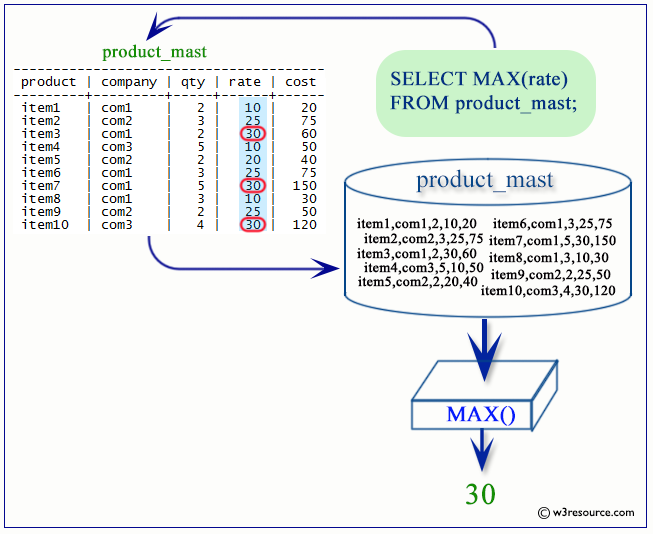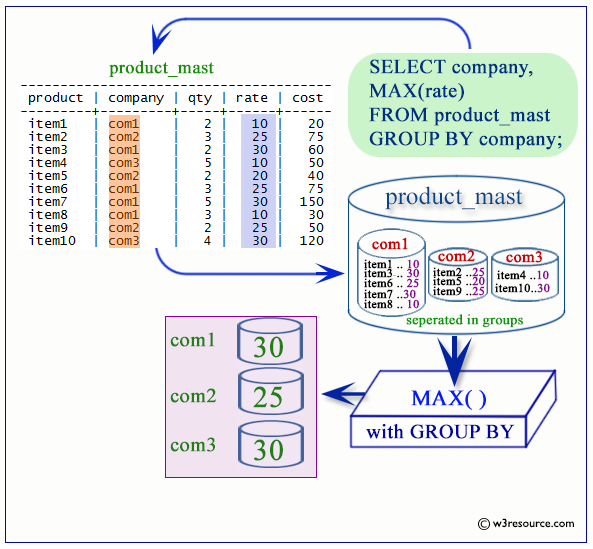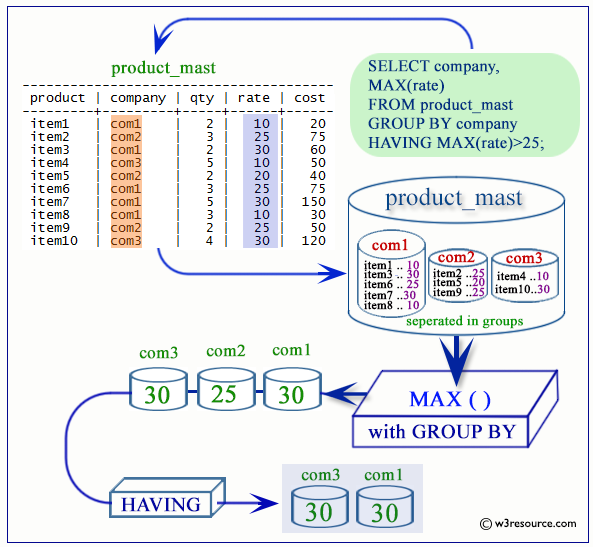PostgreSQL MAX function
MAX function
The PostgreSQL MAX function returns the maximum value, specified by expression in a set of aggregated rows. This function accepts an expression including any numeric, string, date, or time data type values and returns the maximum as a value of the same data type as specified in the expression .
Syntax:
MAX (* | [DISTINCT] ALL | column_name)
Parameters
| Name | Description |
|---|---|
| column_name | Name of the column |
| * | The asterisk(*) indicates all the rows. |
| DISTINCT | This clause is optional. It indicates uniqueness. |
| ALL | This clause is optional. It is default clause. |
Contents:
PostgreSQL MAX function example
N.B. The DISTINCT and ALL have no effect since the maximum value would be same in either case.
The sample table
If we want to find the maximum salary from all employees in the employee table, the following SQL can be used.
SQL Code:
SELECT MAX(salary)
FROM employee;
Output:

Visual Presentation of PostgreSQL MAX() function
PostgreSQL MAX as a level
If we want to find the maximum salary from all employees and show the result against 'Maximum Salary' head in the employee table, the following SQL can be used.
SQL Code:
SELECT MAX(salary) AS "Maximum Salary"
FROM employee;
OR
SQL Code:
SELECT MAX(DISTINCT salary) AS "Maximum Salary"
FROM employee;
OR
SQL Code:
SELECT MAX(ALL salary) AS "Maximum Salary"
FROM employee;
Output:

PostgreSQL MAX function two columns
If we want to get the maximum salary and commission from employee table, the following SQL can be used.
SQL Code:
SELECT MAX(salary) "Maximum Salary",
MAX(commission) "Maximum Commission"
FROM employee;
Output:

PostgreSQL MAX WHERE clause
If we want to get the maximum salary and deduction from employee table whose designation is CLERCK, the following SQL can be used.
SQL Code:
SELECT MAX(salary)AS "Maximum Salary",
MAX(deduction) AS "Maximum Deduction"
FROM employee
WHERE designame='CLERCK';
Output:

PostgreSQL MAX with GROUP BY
Sample table: employees
If we want to get the maximum salary for each designation available in employees table, the following SQL can be used.
SQL Code:
SELECT job_id, MAX(salary) AS "Maximum Salary"
FROM employees
GROUP BY job_id;
Output:
job_id | Maximum Salary ------------+---------------- AC_ACCOUNT | 8300.00 ST_MAN | 8200.00 IT_PROG | 9000.00 SA_MAN | 14000.00 AD_PRES | 24000.00 AC_MGR | 12000.00 FI_MGR | 12000.00 AD_ASST | 4400.00 MK_MAN | 13000.00 PU_CLERK | 3100.00 HR_REP | 6500.00 PR_REP | 10000.00 FI_ACCOUNT | 9000.00 SH_CLERK | 4200.00 AD_VP | 17000.00 SA_REP | 11500.00 ST_CLERK | 3600.00 MK_REP | 6000.00 PU_MAN | 11000.00 (19 rows)
Visual Presentation of PostgreSQL MAX with GROUP BY
PostgreSQL MAX with HAVING CLAUSE
Sample table: employees
If we want to get those designations, whose maximum salary is 6500 and above within the salary range below 12000, the following SQL can be used.
SQL Code:
SELECT job_id,MAX(salary) AS "Maximum Salary"
FROM employees
WHERE salary<12000
GROUP BY job_id
HAVING MAX(salary)>=6500;
Output:
job_id | Maximum Salary ------------+---------------- AC_ACCOUNT | 8300.00 ST_MAN | 8200.00 IT_PROG | 9000.00 SA_MAN | 11000.00 HR_REP | 6500.00 PR_REP | 10000.00 FI_ACCOUNT | 9000.00 SA_REP | 11500.00 PU_MAN | 11000.00 (9 rows)
Visual Presentation of PostgreSQL MAX with HAVING
PostgreSQL MAX with GROUP BY and ORDER BY
Sample table: employees
The following query will return the designation which maximum salary is 6500 and above within the salary range below 12000 and the maximum salary for each designation comes in the list in descending order.
SQL Code:
SELECT job_id,MAX(salary) AS "Maximum Salary"
FROM employees
WHERE salary<12000
GROUP BY job_id
HAVING MAX(salary)>=6500
ORDER BY MAX(salary) DESC;
Output:
job_id | Maximum Salary ------------+---------------- SA_REP | 11500.00 PU_MAN | 11000.00 SA_MAN | 11000.00 PR_REP | 10000.00 FI_ACCOUNT | 9000.00 IT_PROG | 9000.00 AC_ACCOUNT | 8300.00 ST_MAN | 8200.00 HR_REP | 6500.00 (9 rows)




